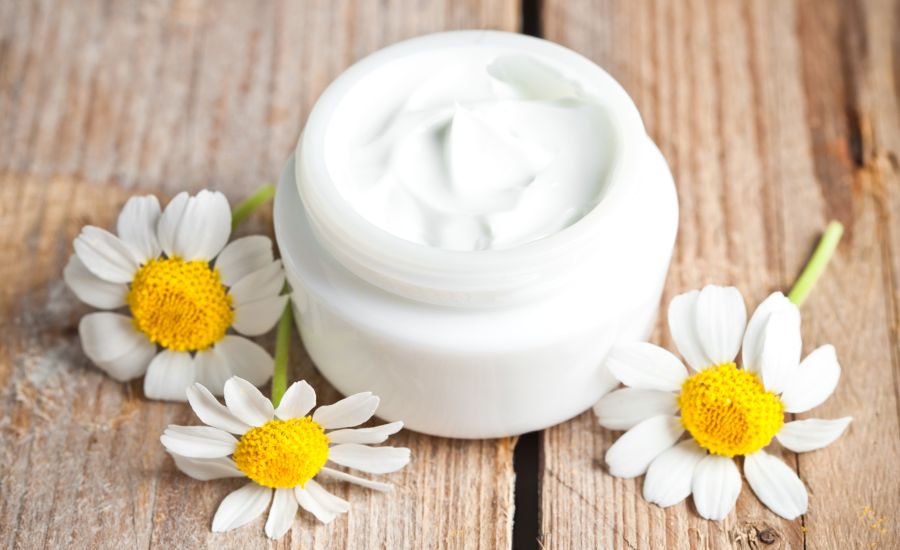Chamomile (Matricaria chamomilla) is a dried flower that can be found pre-packaged at most health food stores. Chamomile tea has been used for centuries as a home remedy for various ailments. Chamomile’s anti-inflammatory properties make it a promising treatment for various inflammatory disorders, including diabetes, arthritis, and Crohn’s disease.
While chamomile tea has traditionally been used as a relaxant, studies have shown that it can also help to reduce stress and promote sleep. Chamomile’s calming effect may be due to its ability to increase serotonin and melatonin levels in the brain. Chamomile tea is generally considered safe, but it can cause allergic reactions in some people. If allergic to ragweed, you should avoid chamomile, as it can cross-react with ragweed pollen.
Chamomile is an herb with many skincare benefits. Chamomile contains bisabolol, which helps soothe and regenerate skin cells. Chamomile also has anti-inflammatory properties that can help reduce redness and inflammation. Additionally, chamomile is a natural antioxidant that can help protect skin from free radicals and other environmental stressors. Finally, chamomile extract is beneficial for healing and restoring the skin’s natural balance. In short, chamomile provides numerous advantages for skin care. Here are five of the most notable.
Table of Contents
1. Chamomile Can Help Soothe And Regenerate Skin Cells
Chamomile (Matricaria chamomilla) is a well-known herb with a long history of use as a natural remedy. Soothing chamomile tea has traditionally been used to soothe the stomach and calm the nerves, and recent studies have shown that chamomile extract can also help to heal the skin. Chamomile contains flavonoids, which are thought to possess anti-inflammatory and antioxidant properties.
When applied to the skin, chamomile extract can help to reduce redness and swelling and promote the regeneration of damaged skin cells. In addition, chamomile essential oil effectively treats eczema and other dermatitis forms. When used regularly, chamomile can help to keep the skin looking smooth, soft, and healthy.
2. Chamomile Has Anti-inflammatory Properties
Chamomile tea is still a popular home remedy for digestive upset and anxiety, and chamomile extract is commonly found in skincare products. Chamomile’s popularity is due in part to its anti-inflammatory properties. Chamomile extract has been shown to inhibit the production of pro-inflammatory cytokines, and it has also been shown to have antioxidant activity.
Chamomile’s anti-inflammatory properties make it a promising treatment for various inflammatory disorders, including diabetes, arthritis, and Crohn’s disease. Clinical studies are needed to confirm chamomile’s efficacy in treating these conditions, but the available evidence suggests that chamomile may be a valuable addition to the natural medicine cabinet.
3. Chamomile is a Natural Antioxidant
Chamomile flavonoids give it natural antioxidant activity. Antioxidants are essential for skin care because they help to protect the skin from damage caused by free radicals. Free radicals are unstable molecules that can damage cells and are a major contributing factor to aging.
Chamomile’s antioxidant activity helps to neutralize free radicals, and it has been shown to reduce the appearance of wrinkles in human skin. Chamomile flavonoids may also help to protect the skin from UV damage. In one study, chamomile extract was found to reduce the formation of sunburn cells when applied to human skin before exposure to UV radiation.
These studies suggest that chamomile may help protect the skin from environmental and intrinsic aging.
4. Chamomile Helps Heal and Restore the Skin’s Natural Balance
Chamomile is a popular ingredient in skincare products for sensitive skin, and it is often used to calm inflamed or irritated skin. Chamomile’s anti-inflammatory properties help to reduce swelling and redness, and its flavonoids can help to improve the appearance of damaged skin. Chamomile extract is also thought to stimulate new cell growth, which can help to heal wounds and scars.
Chamomile’s ability to restore the skin’s natural balance makes it an effective treatment for various conditions, including acne, eczema, and rosacea. Chamomile extract is also often used as a toner or astringent, and it can help treat oily or combination skin.
5. Chamomile is Gentle And Can Be Used On All Skin Types
Chamomile is a gentle herb used on all skin types, including sensitive skin. Chamomile’s anti-inflammatory and antioxidant properties make it an effective treatment for various skin conditions, and its calming effect can help reduce stress and promote relaxation. Chamomile essential oil is also often used in aromatherapy, and it can help reduce stress and promote a sense of calm.
If you are interested in using chamomile for skincare, many products contain chamomile extract or essential oil. Chamomile tea bags can also be used to make a compress that can be applied to the skin. Chamomile is generally considered safe, but it can cause allergic reactions in some people. If you are allergic to ragweed, you may also be allergic to chamomile. If you have never used chamomile on your skin, it is best to test a small area first to ensure you are not allergic.
In Conclusion
Chamomile is a versatile and effective ingredient for skincare. Chamomile’s anti-inflammatory and antioxidant properties make it an excellent choice for sensitive skin. Its ability to heal and restore the skin’s natural balance makes it a valuable addition to any skincare routine. The studies show that chamomile has various skincare advantages, making it a must-have in any natural medicine cabinet.

